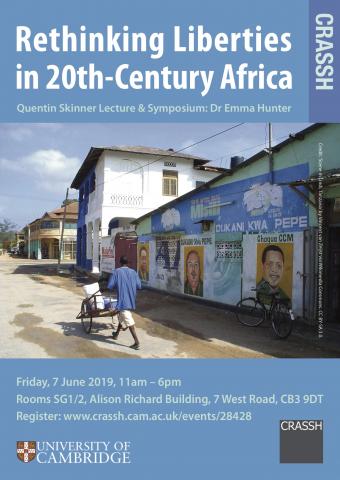Quentin Skinner Lecture and Symposium 2019
Rethinking Liberties in Twentieth-Century Africa
Dr. Emma Hunter (University of Edinburgh)
Friday 7 June 2019, 11.00 - 18.00
SG1/2, Alison Richard Building, Sidgwick Site
Directions to venue
The Quentin Skinner Fellow for 2018-19, Dr Emma Hunter, will give the annual lecture and participate in the related symposium. Online registration is now available. Please click here to book your place or use the online registration link on this page. The standard fee is £20, and £10 for students/unwaged. This includes lunch and refreshments. The programme is available here.
---
Once approached primarily as part of the history of the West, liberalism has recently begun to receive attention from a global perspective. Yet the history of liberalism in twentieth-century Africa remains little studied. This is perhaps not surprising. Powerful historiographical frameworks have marginalised the history of liberal thought in Africa. In both the scholarly and popular imagination, colonial rule in the first half of the twentieth century in Africa is understood as defined by a conservative reaction against what had come to be seen as the failed liberal projects of the nineteenth century. If in the 1940s and 1950s, liberal thought seemed briefly to take centre stage, the years after independence again seemed to bear witness to its renewed marginalization.
However, a great deal of the reworking of core political concepts which characterized the political thought of twentieth-century Africa took place in dialogue with global ideas which owed much to thinkers situated in a liberal tradition. At the same time, studying political thinking in Africa both in the present and in the past reveals the importance of strands of thinking about freedom which were on the margins of or outside these traditions. These strands of thought are often hidden from view. Sometimes this is because written sources do not exist or the languages in which they are written or the archives in which they are conserved make them hard for historians to access. Sometimes they are hidden from view by the categories through which historians work.
These issues, and the methodological challenges involved in addressing them, will be the focus of the Quentin Skinner Colloquium of 2019. The Colloquium will provide an opportunity to explore the history of liberalism, broadly defined, in twentieth-century and twenty-first-century Africa, as well as to contribute to a wider methodological discussion, prompted by the emergence of the new field of global intellectual history, on how to move the study of the history of political thought beyond Western contexts.
Emma Hunter is a Senior Lecturer in History at the University of Edinburgh. She holds a PhD in History from the University of Cambridge (2008). Before moving to Edinburgh, she was a Fellow and Lecturer in History at Gonville and Caius College, Cambridge. Her research interests include the intellectual history of twentieth-century Africa and the history of African print cultures. Her first book, Political Thought and the Public Sphere in Tanzania: Freedom, Democracy and Citizenship in the Era of Decolonization, published by Cambridge University Press in 2015, is an intellectual and political history of African decolonization which explores the ways in which universal questions of political theory were argued over in a specific context in a time of dramatic political change. It was awarded the Royal Historical Society’s Gladstone Prize in 2016. Other recent publications include ‘Languages of Freedom in Decolonising Africa', Transactions of the Royal Historical Society (2017); Citizenship, Belonging and Political Community in Africa: Dialogues between Past and Present, published by Ohio University Press in 2016; and, with Derek Peterson and Stephanie Newell, African Print Cultures: Newspapers and their Publics in the Twentieth Century, published by the University of Michigan Press in 2016.
---
The Quentin Skinner Lecture and Symposium are made possible by the generosity of Professor Quentin Skinner, and afford an opportunity to an early career scholar to present and discuss new work.
